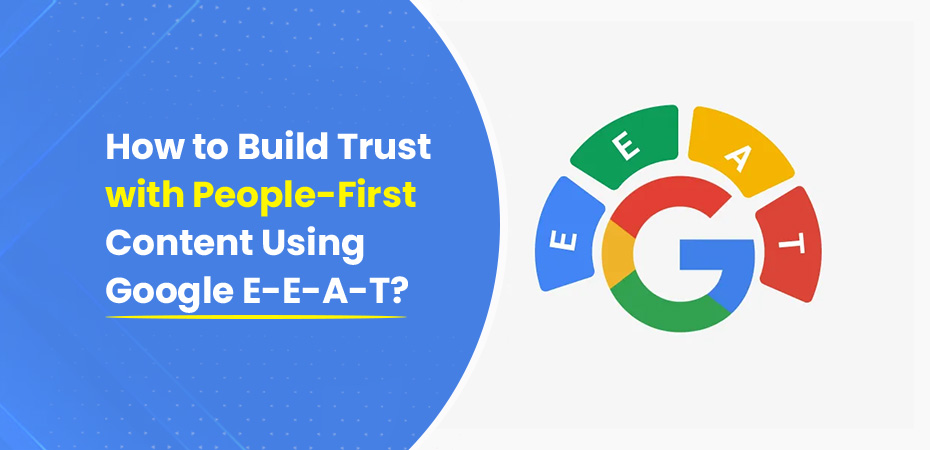How to Build Trust with People-First Content Using Google E-E-A-T?



In today’s digital landscape, building trust with your audience is essential for success. But how do you do that? Google’s E-E-A-T framework—Experience, Expertise, Authoritativeness, and Trustworthiness—provides a roadmap for creating content that resonates with users and search engines alike. In this comprehensive guide, we’ll explore how to build trust through people-first content using Google EEAT principles, helping you stand out from the competition and improve your website’s visibility.
What Is E-E-A-T?
You might be wondering, What is E-E-A-T? This acronym stands for the following:
- Experience: Content that is created by someone with actual, hands-on experience with the subject matter.
- Expertise: The level of knowledge or skill that the content creator has in a particular field.
- Authoritativeness: The overall recognition and credibility of the content creator or the website in the broader community.
- Trustworthiness: The transparency, reliability, and integrity of the content and the website as a whole.
These factors are at the core of how Google assesses content quality. When we talk about E-E-A-T in SEO, we’re discussing how well your content demonstrates these qualities to users and search engines. Now, let’s go deeper into each part of E-E-A-T to understand how it can make your content more trustworthy and help it perform better on Google SE (search engine).
Experience: Providing First-Hand Knowledge
The first component of E-E-A-T is Experience, which emphasizes the importance of personal involvement or direct interaction with the subject matter. Google’s Experience is the newest addition to the EAT Google framework, and it’s especially important for topics where first-hand experience makes a difference in the quality and credibility of the information provided.
For example, if you’re writing a product review, it’s much more valuable to the reader if you have personally used the product rather than just summarizing information from other websites. First-hand experience means in this context is that you can share insights and opinions based on what you actually encountered.
To demonstrate experience, share real-world examples, tell personal stories, and explain how you’ve interacted with the subject matter. If you’re providing a tutorial, make sure you’ve gone through the steps yourself and can offer unique tips based on your personal experiences.
Expertise: Showing You Know Your Stuff
Next, we have Expertise, which focuses on your level of knowledge and proficiency in a given subject. When Google evaluates content, it looks for creators who have a deep understanding of the topic they are discussing. But how can you show that you’re an expert?
One way to prove your expertise is by including information about your qualifications, education, or relevant experiences in your content. For instance, a blog post about medical advice will be more trustworthy if written by a doctor rather than a general writer. This is because Google values content created by those who have a knowledge-based trust in their field.
When writing content, use precise, accurate information that reflects a high level of expertise. Cite credible sources, include detailed explanations, and avoid making unsupported claims. Doing so will improve your expertise SEO and help your content rank better on Google.
Authoritativeness: Building Your Online Reputation
Authoritativeness refers to the recognition and reputation you or your website holds within your industry. This is often measured by external signals such as backlinks from reputable websites, mentions in respected publications, or positive reviews from other experts in your field.
Being seen as an authoritative source takes time, but you can start by consistently producing high-quality content that others find valuable and want to reference. Networking with other experts in your niche, guest blogging on well-known websites, and building a community around your content are also great ways to enhance your authority.
Google will look at how many people rely on your content and whether other authoritative sites link back to you. The more you’re seen as an expert by others in your industry, the stronger your website’s authoritativeness will be.
Trustworthiness: The Key to Long-Term Success
Finally, there’s Trustworthiness, which is arguably the most important factor of E-E-A-T. If your audience can’t trust your content, everything else falls apart. Trustworthiness is about being honest, transparent, and providing accurate information.
There are several ways to build trust with your audience. First, make sure all your content is fact-checked and up-to-date. If you make claims, back them up with reliable sources. It’s also important to be transparent about your intentions—if you’re being paid to promote a product, disclose that to your audience.
Additionally, maintaining a secure website (with HTTPS), offering clear privacy policies, and being transparent about your content’s authorship can all contribute to building trust.
Trustworthiness is especially critical for websites that deal with sensitive topics like health, finance, or legal advice. Google calls these YMYL (Your Money or Your Life) topics, and content in these areas must adhere to the highest standards of trust and accuracy to rank well.
Why Google Prioritizes People-First Content
So why does Google emphasize people-first content? At its core, Google is a search engine that wants to provide its users with the best, most relevant answers to their queries. To achieve this, it needs to prioritize content that solves real problems, offers valuable insights, and is written with the user in mind.
As we move into the age of AI-generated content, it’s even more critical to produce content that genuinely helps people. While AI tools can assist in content creation, they can’t replace the importance of first-hand experience and human insight. Google wants to ensure that the content it ranks highest is created by people who understand the topics they’re writing about and can offer unique perspectives based on their own experiences.
Google’s Shift from E-A-T to E-E-A-T
Initially, it was Google EAT framework—Expertise, Authoritativeness, Trustworthiness—to assess content quality. But as more content flooded the web, Google realized that having experience with the subject matter was just as important as being an expert or trusted source. This led to the addition of Experience to create the EEAT Google framework.
This shift highlights Google’s commitment to surfacing content that not only offers expert knowledge but also resonates with users because it’s grounded in real-world experiences.
How to Demonstrate E-E-A-T for Your Brand?
Now that we understand the components of E-E-A-T, let’s talk about how you can demonstrate these qualities in your content. Here are some practical steps you can take to show experience, expertise, authoritativeness, and trustworthiness on your website.
Experience: Share Real Stories and Examples
The easiest way to demonstrate experience is by sharing personal stories, case studies, or real-world examples. For example, if you’re writing a tutorial on how to fix a plumbing issue, describe how you encountered and solved that problem yourself. This not only makes your content more engaging but also helps build trust with your audience.
Including images or videos of your work can also boost your credibility. If your audience can see that you’ve actually done what you’re talking about, they’re more likely to trust your advice.
Expertise: Back Up Your Claims with Data
When writing content, always make sure you provide evidence of your expertise. This could mean linking to studies, including data, or quoting industry experts. If you have relevant qualifications, make sure to mention them. For example, if you’re writing about fitness, include your certifications as a trainer to show you know what you’re talking about.
You can also invite guest experts to contribute to your blog or website. This not only adds value to your content but also enhances your expertise SEO by aligning your brand with other knowledgeable figures in your industry.
Authoritativeness: Get Recognized by Others in Your Field
Building authoritativeness takes time and effort, but one of the best ways to do it is by getting recognized by others in your field. Start by networking with other experts, writing guest posts for reputable blogs, and getting mentioned in industry publications.
Another way to build authority is by creating valuable content that others want to link to. The more high-quality backlinks you can earn from trusted websites, the more authoritative your content will appear to Google.
Trustworthiness: Be Transparent and Reliable
To establish trustworthiness, it’s essential to be transparent in everything you do. Always disclose if you’re being paid to promote a product, and make sure your audience knows who’s behind the content they’re reading. Include author bios, and if your website covers sensitive topics like health or finance, make sure you have a team of experts reviewing your content.
You should also regularly update your content to ensure it remains accurate. Providing outdated or incorrect information can quickly erode the trust you’ve built with your audience.
Creating User-Focused Content
As important as E-E-A-T is, it’s equally important to create content that’s user-focused. Google rewards content that directly addresses the questions and concerns users have when they search for information online. This is known as people-first content.
So, how can you make sure your content is focused on the user? Here are a few strategies to consider:
- Address User Intent: When creating content, think about what your audience is looking for. If someone searches for “how to fix a leaky faucet,” they’re probably looking for a step-by-step guide. Don’t focus on selling a product right away; instead, provide the valuable information they need.
- Use Clear, Simple Language: Avoid jargon and overly technical terms unless your audience is highly specialized. Write in a way that’s easy to understand, and break down complex ideas into simple explanations.
- Encourage Engagement: Include calls to action that invite your readers to leave comments, ask questions, or share their own experiences. The more engaged your audience is, the more trustworthy your content will appear.
E-E-A-T in Practice: Real-World Examples
Here are a few examples of websites that have successfully implemented E-E-A-T into their content strategies and built trust with their audiences.
Example 1: Dogster
Dogster, a popular website about dog care, demonstrates Experience by having articles written by veterinarians and dog trainers who have hands-on experience with the topics they cover. This gives readers confidence that the advice they’re receiving is reliable and backed by real-world experience.
Example 2: GadgetMates
GadgetMates, an electronics repair shop, builds Authoritativeness by creating content based on their everyday work. Their guides on repairing gadgets are trustworthy because they come from professionals who deal with these issues on a daily basis.
Example 3: Homesteading Family
The Homesteading Family blog showcases Experience by sharing personal stories about homesteading. The creators talk about their own successes and failures, providing practical, first-hand knowledge that builds trust with their audience.
E-E-A-T and AI-Generated Content
With the rise of AI tools like ChatGPT, many people are wondering how E-E-A-T applies to AI-generated content. While AI can be useful for creating content quickly, it can’t replace the value of human expertise and experience. Google’s helpful content guidelines make it clear that AI content must still be reviewed and edited by a human expert to meet quality standards.
AI can assist with research, idea generation, and even writing, but it should be used as a tool, not a replacement for human insight. First-hand experience and personal stories are elements that AI can’t replicate, and that’s why Google will continue to prioritize content created by humans.
Conclusion
Incorporating E-E-A-T into your content strategy is key to building trust with both users and search engines. While not a direct ranking factor, Google uses E-E-A-T to assess your site’s quality and trustworthiness. Prioritizing people-first content helps you foster strong connections with your audience and supports long-term SEO success. Whether you’re utilizing AI, establishing authority in your field, or sharing personal insights, aligning with E-E-A-T guidelines will set your brand apart.
Stay ahead in today’s competitive landscape—partner with Hire Core Web Vitals Consultants to ensure your content meets these standards and drives sustainable growth!